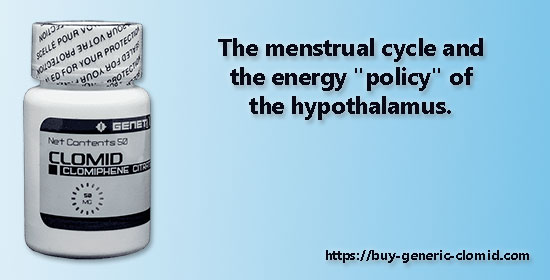The menstrual cycle is one of the most mysterious phenomena in human biology. Why did our species develop a rhythmic ovulation that is independent of coitus? What is the biological meaning of menstrual bleeding, which is absent in other mammals? There are also more practical questions: it is known that physical and psychological stress, as well as body weight, significantly affect the menstrual cycle – but how and why does this happen? In search of answers, we turn to high-level processes – the analytical system of the hypothalamus.
The extension of the genus requires an optimal external and internal environment. A woman should be safe, have a favorable social environment, and have unrestricted access to nutrients. Otherwise, the pregnancy may be terminated or the fetus will suffer from developmental defects.
How can the body assess the many external and internal factors and make a choice: to take the risk of conception now-or to sacrifice part of the fertile time, waiting for more suitable conditions? Taking into account the complexity of the task, we can say that the choice of physiological states suitable for conception cannot be carried out by the pelvic organs. This function should be performed by an organ that “knows” the whole physiological context.
Menstrual cycle: Stress and procreation
In modern biology, the concept of “stress” means an overload of the adaptive abilities of the body. As a universal response to long-term adverse conditions, the hypothalamus increases plasma cortisol (and CSF) through the pituitary-adrenal system. In response, cortisol, among other things, suppresses the secretion of GnRH. This occurs in a variety of chronic conditions, different in nature and origin, but uniformly interpreted by the hypothalamus as stress: depression and anxiety disorders, diabetes, alcoholism, violation of the “sleep – wake” mode (working night shifts). Excess cortisol is also seen in many professional athletes.

So, the species Homo sapiens is adapted to long-distance running, in which endogenous cannabinoids enter the blood. At the dawn of human history, they made it easier to run for hours during times of migration and hunting, providing an analgesic and euphoric effect. Of course, they also inhibit the release of GnRH, since such severe trials are not combined with the prolongation of the genus. This probably explains some of the cases of amenorrhea among the runners these days.
Social and psychological stress
Human society has undergone significant changes over the last millennium. However, social distress, lifestyle changes, and information overload involve the same stressful mechanisms as the threat to physical survival.
In many mammals, females fight among themselves for resources and those partners that could provide tactical and genetic advantages to future offspring. In primates, a subordinate social position causes an increase in cortisol plasma. At the same time, the peak luteinizing hormone emissions required for ovulation are reduced. As resources decrease and aggressiveness increases within the community, conception is most promising in the dominant female. Aggression, including between close relatives, seems to play an important role in the suppression of ovulation among subordinate individuals.
Menstrual cycle and microecology of nutrition
In addition to the three main nutritional classes: proteins, fats and carbohydrates – with each meal, the human body receives microscopic doses of regulatory substances that have not nutritional, but informational value. The availability of vitamins of plant and animal origin historically included Homo sapiens in specific food chains, and the microelement composition of the environment determined favorable zones for habitation. Thus, vitamins and trace elements, whose importance is often underestimated, combine the biogeocenosis with individual physiology. The female body, constantly looking for optimal conditions for the prolongation of the genus, can not ignore such data.
Today, humanity has spread across the globe everywhere, often spending most of their lives moving. Thus, medical science is faced with the task of compensating for the change of ecological subsystems, which in market conditions is available only through the development of universal adaptive complexes. The degree of their influence is individual, because each organism is unique. However, such substitution drugs occupy their own therapeutic niche along with higher-level treatment methods.
Conclusion
It is possible that both in cases of metabolic stress and in cases of chronic psychological threats, the hypothalamus acts uniformly: it seeks to protect the body by reducing energy consumption and preventing risky pregnancy. This should be taken into account in patients with functional amenorrhea. In such cases, replacement therapy alone may not be sufficient, as it does not affect adrenal hyperfunction, body weight, and psychological problems. Even with artificially induced ovulation, subsequent pregnancy is threatened by ongoing psychological and / or metabolic stress. In other words, the full restoration of sexual function requires the correction of a fundamental problem-lifestyle.